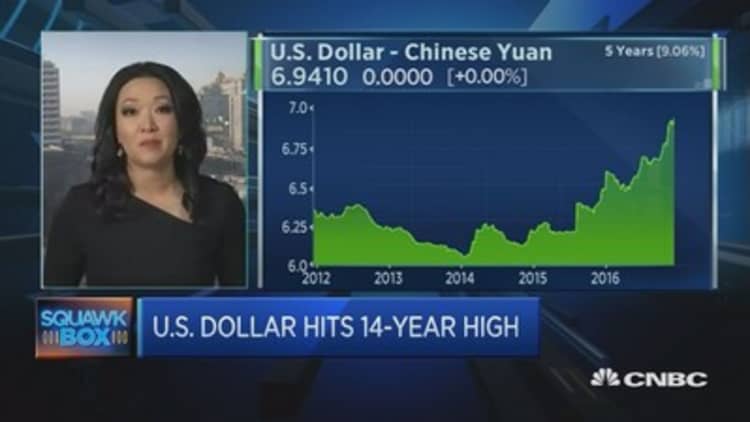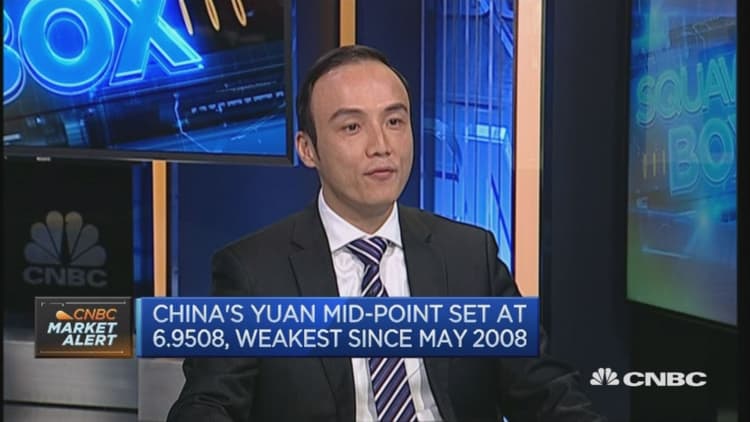
An interest rate decision in the United States is causing a dilemma for Beijing.
The U.S. dollar index surged to a near 14-year high after the Fed's rate hike on Wednesday and its surprise forecast for three more increases — instead of the two that were expected previously — to come in 2017.
Higher interest rates in the United States make it tempting for China to raise its own rates, because Beijing doesn't want more money to flee the country into higher-yielding U.S. bonds. That flight also hurts China's currency, the yuan. But Beijing could get its economy into trouble by hiking rates, since its continued economic growth is very heavily driven by borrowing.
"You had this pressure that was already building, and the Fed has basically complicated and added to that with a more hawkish message," said Logan Wright, director, China markets research at Rhodium Group.
China's yuan subsequently fell to its lowest level since 2008, and the country's 10-year bond yield jumped to its highest level in more than a year. Declines in five-year and 10-year Chinese bond futures were reportedly so drastic Thursday that trade was halted due to a market trading limit.

"The bond market itself, it's raising a lot of attention, and it's likely reflecting [that] policymakers in China are facing a difficult choice right now," said Kai Yan, an economist at the International Monetary Fund. He noted that "the speculation in the market is high because the central bank wants to stand in front of currency pressure to prevent capital outflow."
Chinese policymakers must "either hike the interest rate (as) the U.S. does, or they give up the exchange rate," Yan said. "It is likely they will do a combination of the two."
Now there are rising concerns that problems in the world's second-largest economy may again rattle markets globally.
China's financial and economic challenges have been on the back burner for U.S. markets for much of the past year. The yuan's depreciation versus the dollar has been largely ignored by global markets, as economic updates out of China have held up thanks largely to a flood of debt that's propping up the country's economy.
Earlier this year, the Fed was seen as giving China some breathing room to stabilize its currency and economic growth. The U.S. central bank cited international concerns in avoiding a rate hike in the fall of 2015 and reducing its expectations for 2016 rate increases.
Those decisions from the Fed helped keep the dollar steady, allowing China to avoid a significant depreciation of its currency.
Now, however, some say the Fed may be less concerned about China since the U.S. economy is on firmer footing and can expect big domestic government spending from President-elect Donald Trump's proposals.
If Fed policymakers "feel Trump's policies can help insulate the U.S. from global volatility (still an unknown in my view), then the Fed would be more willing to persist with its normalization with less regard for global developments," Tai Hui, managing director and chief Asia market strategist at JPMorgan Funds, said in an email.
Markets overreacting?
To be sure, analysts noted that this week's sliding yuan and rising bond rates are both part of an ongoing, monthslong trend.
"I think it's not a sign of huge distress," said Nicholas Lardy of the Peterson Institute for International Economics. "They have been tightening on the interbank market a bit and they have allowed rates to spike a bit ... this has happened several times in the last several years."
"The likelihood is the markets are overreacting to a very short-term development," Lardy said.
Regardless, the road ahead for China's authorities remains a difficult one. Economists at Hong Kong-based financial research firm CLSA summed up China's challenges in a Friday statement:
Policymakers in all countries have to choose between conflicting policy objectives. But investors appear to question China's "deftness" more than that of other countries. That the choice is made correctly is more important for China than elsewhere.
Chinese leaders met this week for their annual Central Economic Work Conference, and afterward the state-run Chinese news agency Xinhua reported that Beijing will "put more emphasis on prevention of financial risks in 2017," increase efforts to prevent asset bubbles and improve regulation to "ensure there will be no systematic financial risk."
"If you think that there's a preference for stability in 2017, it can actually enforce your incentives to deal with problems in advance," Rhodium's Wright said.


